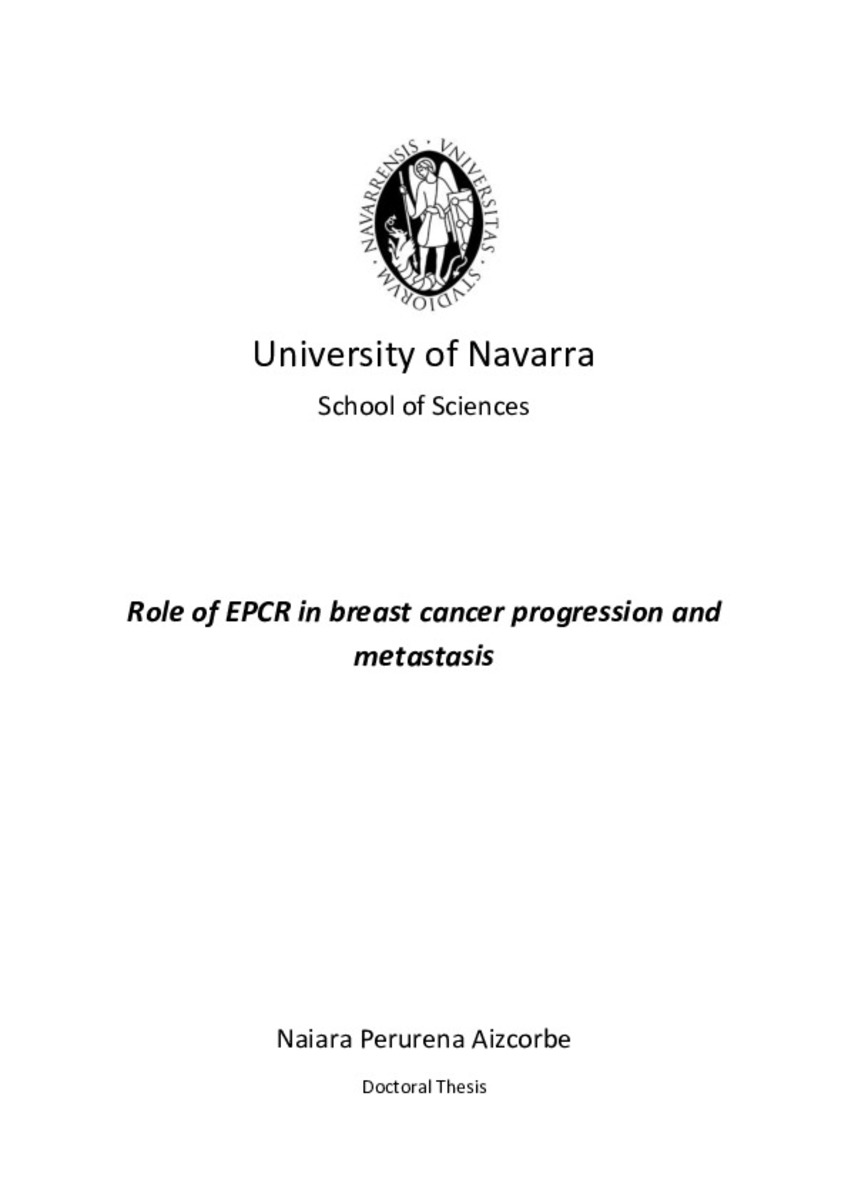Registro completo de metadatos
| Campo DC | Valor | Lengua/Idioma |
|---|---|---|
| dc.contributor.advisor | Lecanda, F. (Fernando) | - |
| dc.creator | Perurena, N. (Naiara) | - |
| dc.date.accessioned | 2016-05-03T07:52:43Z | - |
| dc.date.available | 2016-05-03T07:52:43Z | - |
| dc.date.issued | 2015-08-27 | - |
| dc.date.submitted | 2015-09-03 | - |
| dc.identifier.citation | PERURENA, Naiara. “Role of EPCR in breast cancer progression and metastasis”. Lecanda, Fernando. Tesis doctoral. Universidad de Navarra, Pamplona, 2015 | es_ES |
| dc.identifier.uri | https://hdl.handle.net/10171/40477 | - |
| dc.description.abstract | Endothelial protein C receptor (EPCR) is a transmembrane receptor widely expressed in endothelial cells where it exerts cytoprotective and anticoagulant activities. It is also expressed in lung tumor cells where EPCR promotes tumor cell survival and increases metastatic activity. However, to date the contribution of EPCR to tumorigenesis and metastasis in breast cancer remains ill defined. Global expression analysis in a cohort of 286 breast cancer patients revealed that patients with high EPCR expression levels have significantly shorter relapse-free survival times. In vitro, stimulation with activated protein C (APC) or shRNA-mediated EPCR silencing did not alter growth kinetics of bone metastatic human breast cancer cells in basal or pro-apoptotic conditions. However, subcutaneous and orthotopic inoculation of control and EPCR-silenced (shEPCR) bone metastatic cells showed a marked reduction in tumor growth, while markers of cell growth, apoptosis and angiogenesis were unaffected. EPCR effects on tumorigenesis were independent of heterotypic tumor-stroma interactions, including fibroblasts and immune cells. Interestingly, EPCR silencing led to a substantial reduction in skeletal metastatic burden and osteolytic lesions in an intracardiac inoculation model, compared to control cells. Moreover, EPCR silencing reduced tumor bone colonization in a model of intratibial injection. Furthermore, lung metastasis was blocked in another in vivo model of metastasis when EPCR was silenced in murine breast tumor cells, despite their similar growth kinetics in vitro. Transcriptomic analysis of tumors identified SPOCK1 as the most robustly downregulated gene in EPCR-silenced tumors. Furthermore, SPOCK1 expression levels were associated with high EPCR expression levels in breast cancer patients and correlated with shorter relapse-free survival times in a subset of breast cancer patients. These data indicate that EPCR is a clinically relevant factor in breast cancer, which promotes primary tumor growth and metastatic activity in target organs, including the skeleton and lungs. Taken together, these data suggest that EPCR represents a potential therapeutic target in breast cancer metastasis. | es_ES |
| dc.language.iso | spa | es_ES |
| dc.rights | info:eu-repo/semantics/openAccess | es_ES |
| dc.subject | Biología celular | es_ES |
| dc.subject | Biología molecular | es_ES |
| dc.subject | Carcinogenésis | es_ES |
| dc.subject | Materias Investigacion::Ciencias de la Salud | es_ES |
| dc.title | Role of EPCR in breast cancer progression and metastasis | es_ES |
| dc.type | info:eu-repo/semantics/doctoralThesis | es_ES |
Ficheros en este ítem:
Estadísticas e impacto
Los ítems de Dadun están protegidos por copyright, con todos los derechos reservados, a menos que se indique lo contrario.






